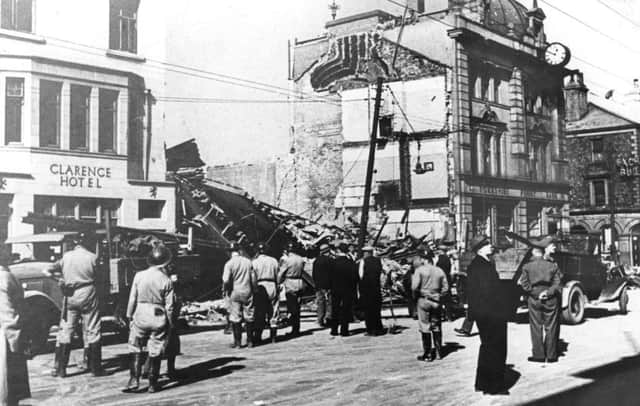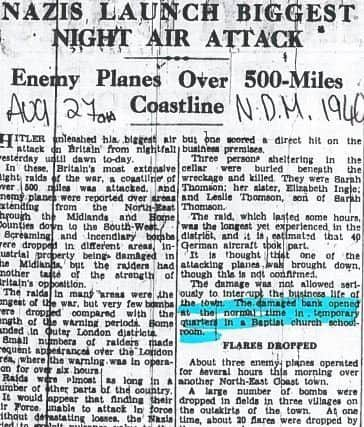Time stood still at the bank as 40 German bombers attacked Hartlepool


Five hundred miles of coastline felt the brunt of the assault in 1940 - and it included Hartlepool.
In fact, one building suffered a direct hit, which left the town with a long-standing reminder of the exact time the bombs dropped.


Advertisement
Hide AdAdvertisement
Hide AdIt was the Yorkshire Penny Bank in Church Street and it was hit at 12.50am on August 27.
We are indebted to the reference section of the Central Library in York Road for providing us with the details.
It’s yet another example of the excellent research carried out by the library’s teams, and which is available to anyone who comes along.
Let’s take a closer look at the day the bombs dropped.
For 41 years, the Penny Bank had stood unharmed in Church Street.
Advertisement
Hide AdAdvertisement
Hide AdKeen savers could pay a visit between 10am and 3pm on weekdays, and 10am to 1pm and 6pm to 8pm on Saturdays.
But on August 27, 1940, it became a part of Hartlepool’s history for a different reason.
The town was targeted in a Nazi air raid lasting from nightfall until dawn.
Screaming and incendiary bombs were dropped, but the enemy didn’t have it all their own way.
Advertisement
Hide AdAdvertisement
Hide AdThe Northern Daily Mail - as the Hartlepool Mail was known at the time - reported: “The raiders had another taste of the strength of Britain’s opposition.”
The bank’s clocks stopped at the time of the raid. The neighbouring Edgar Phillips shop was destroyed, and so was the Clarence Hotel. Three people were killed in the blast.
A Mail report on the incident makes for interesting reading.
It said: “Two shops in the business centre of a North East town were demolished and a bank damaged early today when raiders for the third time dropped a large number of high-explosive bombs.
Advertisement
Hide AdAdvertisement
Hide Ad“Most of the bombs fell on open ground in the outskirts, or in the sea. But one scored a direct hit on the business premises.
“Three persons sheltering in the cellar were buried beneath the wreckage and killed.”
The paper described the air raid as the “longest yet experienced in the district”, with “an estimated 40 German aircraft taking part”.
But resilient Hartlepool soon fought back.
A day after the German attack, the Penny Bank was open once more, even if it was in temporary premises.
Advertisement
Hide AdAdvertisement
Hide AdThe Baptist Schoolroom in nearby Tower Street provided its new home, and customers could get along between 10am and 2pm each weekday, or between 10am and 1pm or 5pm and 7pm on a Saturday.
Britain was in no mood to surrender easily and another part of the Mail story showed just how dogged the people had become.
“A good spirit was evidenced everywhere and this was exemplified in one North-East district when the audience of a local theatre contributed to an impromptu concert during a raid.
“Volunteers, including sailors and soldiers, climbed on the stage and took part.”